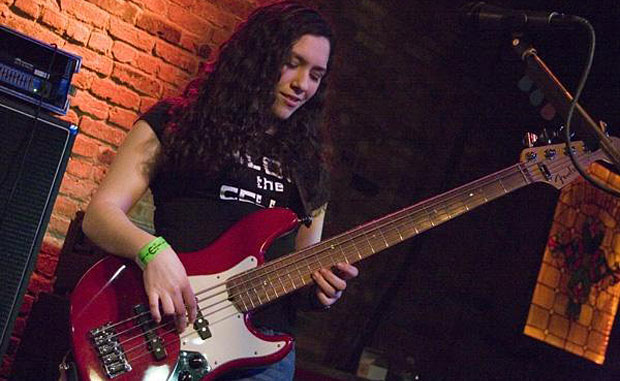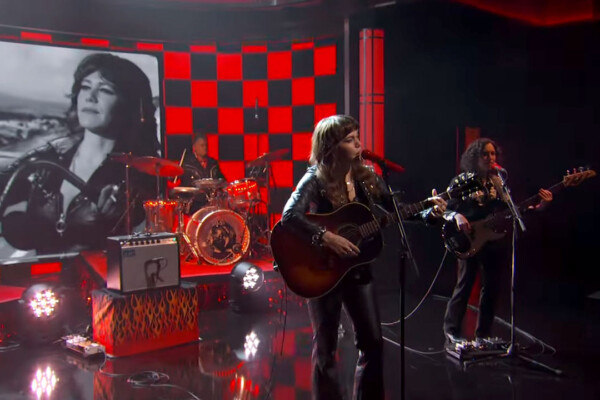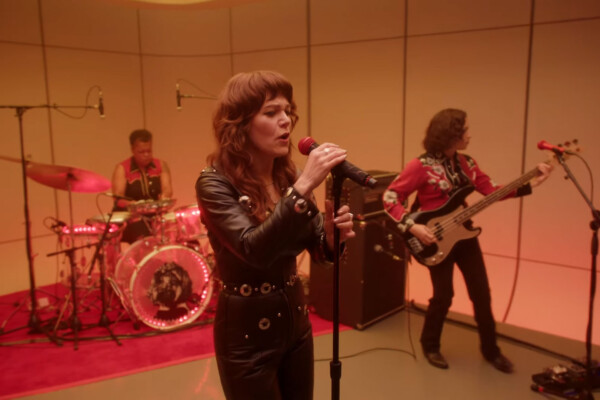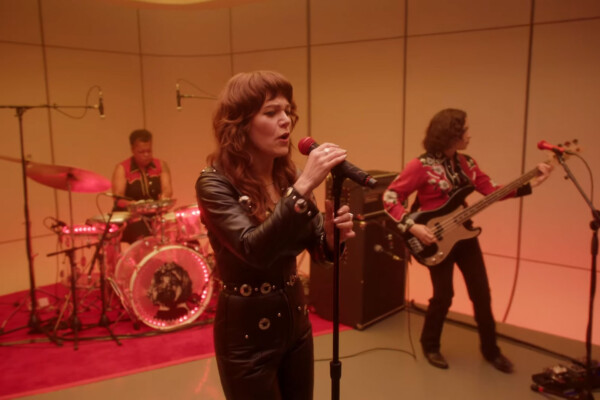Interview With Ryan Madora: Thoughts on Playing without a Drummer

Last week, while enjoying a video from a television show featuring the duo of Ryan Madora on bass and Don Evans on guitar (see below), it reminded me of other playing situations where drummers were not present. This seemed like a perfect opportunity to hear first hand from Ryan on how playing without a drummer has impacted her experience as a professional bassist.
Here Ryan shares her experience and ideas about the shifting roles and responsibilities of bassists in lineups that do not include a drummer.
What are the biggest differences you have experienced playing in groups with and without a drummer?
The biggest differences can be broken into three things: communication, responsibility, and presence. Be open to new arrangements or modifying songs/bass lines, pay attention to the other players, and learn how to read their signals. In terms of responsibility, since there isn’t a drummer, you’re the one responsible for keeping time and grooving. Watch how the other players keep time and try to play along with them while adhering to your role as “rhythm instrument.” If you’re in a duo or trio and are responsible for soloing, don’t be afraid of the dreaded “bass solo!” and get more comfortable taking on the role of a soloist. The other aspect is presence. Since I play mostly in a duo, I am essentially on equal footing with the other player, which is very different compared to being in a full band. Instead of being the bass player standing in the back, you’re right up in front with the other player. Therefore, you need to be more definitive in your playing, tone, and stage presence.
Do you feel the differences are mostly positive or the source of unwelcome challenges setbacks?
I find the differences to be mostly positive, specifically when it comes to communication, playfulness, and dynamics, but it all depends on whom I’m playing with. If I’m playing in a trio, it can be more difficult because if one person gets off rhythmically, it can throw everyone else off and it’s hard to get the ensemble back on track. Also, if I’m in a duo where the other player and I have different ideas of the arrangement and when to transition from one chord to the next, we may push and pull against each other.
How much does not having a drummer impact how you approach constructing bass lines and solos?
In terms of creating bass lines, I tend to think more about note choice and note duration. If I’m playing a song where I typically would pedal one note, I might try to change it up and throw in more 5ths, octaves, and passing tones when transitioning from chord to chord since it’s easier for the other player to get a sense of time by having greater note variety. If I’m playing something like a shuffle, I’ll stick to one distinctive pattern and will specifically play more staccato to allow for a definitive triplet based feel.
For soloing, I tend to have a greater sense of freedom since I can do more with rhythmic phrasing. I don’t have to compete with the drummer (or deal with the drummer getting “playful”) and I can control dynamics better within the solo. Thankfully, the guitar player that I’m currently with keeps great time and knows how to play behind another soloist.
Do you find yourself playing more percussively when the group does not have a drummer?
Yes and no… it depends on the music. Most of the time, yes, I do play more assertively and I put my foot down to say “here is the time!” especially during solos or if the other players are off in la-la land. If I’m playing music that asks for space and sustain, I’m very aware of my note duration and of where the other player is playing. Rather than playing more notes or more percussively, I try to allow for note sustain and directional passing tones to help the music along.
Does playing in a lineup without a drummer influence how you apply dynamics and otherwise interact with other band members?
Of course. The great thing about playing without a drummer is that you don’t have drums to compete with when you come down in volume. Some drummers have a hard time playing quietly and keeping the time where it should be, or they aren’t aware of what is going on within the song to understand where dynamics can make a big difference, either by coming down or by playing louder. In the duo setting, it’s easy to hear what the other player is doing, specifically in solos, so you can do a lot dynamically to inspire the soloist. It’s also easier to communicate verbally, since you can just look at the other player, do a head nod, or say “take it to the bridge” and you can hear what the other is saying.
Is the duo grouping in which you now find yourself any more challenging than some of the larger groups without a drummer in which you have played?
I happen to love the duo that I play with now. The guitar player and I are very much on the same “musical wavelength” when it comes to grooving and since we’ve been playing together for years, we can anticipate what the other person is going to do in certain situations. The lines of communication are completely open and since we are the only players, there is greater musical equality. With a larger drummer-less combo, there are more balls in the air that you need to keep track of. With just a duo, there are fewer things to get in the way of communication and it’s easier to find out where that one person is rhythmically. In terms of challenges, if one person is having a bad day, isn’t listening, or is distracted by other things, the music suffers and it’s harder to groove together.
What is the most crucial advice you can share with bassists who will be playing in combos without a drummer?
When playing with a drummer, you become a unit… “the rhythm section.” Both players are responsible for keeping time, for the feel of the song, and for providing the musical backbone for the rest of the band. Without a drummer, the unit is just you. Be firm when it comes to keeping time and be confident in your ability to groove. Above all else, keep your ears open to what the other members of the combo are doing and think about how to accompany them without pushing and pulling rhythmically. Also think about your tone and how that can influence the sound of the ensemble. You’re still the bass player and you’ve got to have bottom in your tone; at the same time, remember that you need to stick out enough to be rhythmically distinctive and you want to have the right tone for soloing over the other instruments.
Any last minute thoughts or observations you would like to share concerning your approach to the bass in these situations?
Every musical situation is different but the best thing that you can do is “feel” where the other player is. Learn their approach to playing the music and understand how they communicate. Read their signals… head nods, eyebrow raises, and most importantly, how they tap their foot. All of these things contribute to how well you can accompany the other the player, and the more you play with them, the more you will understand their idiosyncrasies and you will learn how to anticipate what they are going to do. Also ask for feedback. Talk to the other players and find out if what you are doing is working for them; find out their expectations and remember that you’re a supportive instrument. Don’t be afraid to modify what you’re used to doing (whether it is tone, tempo, note choice, or the overall groove) in order to make the music sound better.
How about naming a few groups or albums that feature the bassist up front and have no drummer?
That’s a tough question. I’m a huge Beatles fan and there are quite a few Beatles songs (especially on the White Album) where the drums are sparse and the bass is the most prominent rhythm instrument. I’m a fan of Brian Bromberg’s playing and the Wood and Wood II albums have a couple of solo bass tracks on it that groove really well even though there isn’t a drummer. There are also a couple of songwriters (Janis Ian, Joni Mitchell, Norah Jones, Randy Newman, Ray Charles, Van Morrison, and Paul Simon) that I listen to specifically for the bass parts or to hear how certain instruments (guitar or piano) function as both rhythm and solo instruments. Another personal bass player favorite is Richard Bona, because he’s such a diverse player and has a unique approach to the instrument whether he is soloing or just playing bass.
Thanks so much for your time and insights Ryan. Here’s to your continued success on the road, in the studio, and recording. And, thanks for sharing the “part 2” video of the duo playing the second song all the way through during your recent television appearance.
Parts 1 and 2:
 <
< <
<



Very true Ryan, many drummers are heavy-handed and not musical enough to feel the moods and swings in songs especially when other musicians are playing and soloing. To play loudly and softly creates dynamics the whole band can appreciate as well as placed rests, timing changes, and solid time counts. Rock on.
Great job Ryan,
No reason to have a drummer if you have your shit together the way you do.
Cheers!
Hell yeah! I just got turned onto Ryan through this feature. Great playing.. and really tasty solo.
John Mayal put out a record without drums and it confirmed for me just how annoying most symbol sounds are. Crashing symbols add nothing.. Period! A good drummer without symbols adds a great sound. Probably because I am an old shit, but a lot of music is ruined for me because of crashing trash can lids. I will see you at Gypsy’s on Sunday…good music! Robert
When the White Stripes came up with this ridiculous idea of just guitar and drums, I thought a crap, and did not like, now I have to agree without drums is also a crap. A song or two that’s fine, but imagine we hear a whole album, no way…
I play in a, one could say “Beat-less” band. It’s just two guitars, a keyboard, and I. We get along fine without a drummer, mostly because my experience is that most drummers in our area are only interested in playing heavy metal, whilst we are a British Pop/Classic Rock band. Our originals are written to be adaptable for drums (I would know, as I DID write them) but I almost prefer them without a drummer. I would like to say though, I do find myself doing a lot more keeping time in a band without drums than in a band with them. But all in all, Ryan, you’re awesome. Dig the music and the style. Keep it up!
Great tips.Learning from a girl is ok!
Great groove then ….and great groove and feel now in 2015??